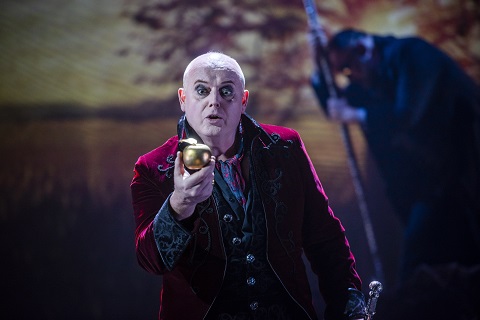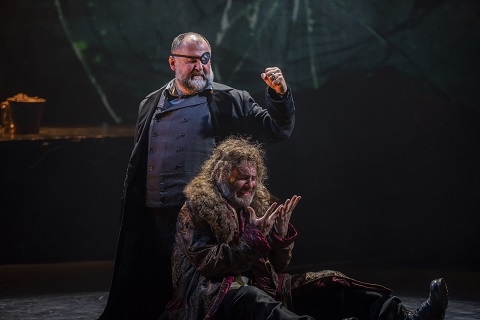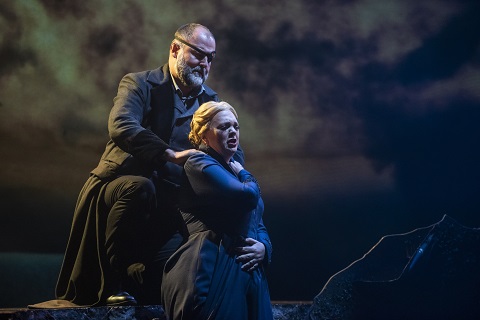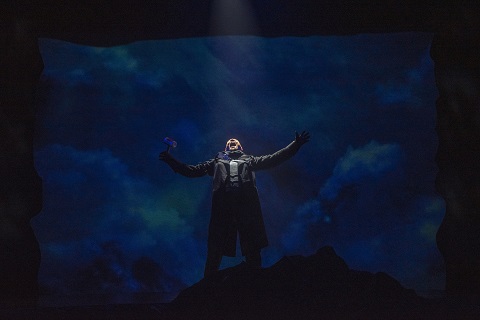Recently in Reviews
English Touring Opera are delighted to announce a season of lyric monodramas to tour nationally from October to December. The season features music for solo singer and piano by Argento, Britten, Tippett and Shostakovich with a bold and inventive approach to making opera during social distancing.
This tenth of ten Live from London concerts was in fact a recorded live performance from California. It was no less enjoyable for that, and it was also uplifting to learn that this wasn’t in fact the ‘last’ LfL event that we will be able to enjoy, courtesy of VOCES8 and their fellow vocal ensembles (more below …).
Ever since Wigmore Hall announced their superb series of autumn concerts, all streamed live and available free of charge, I’d been looking forward to this song recital by Ian Bostridge and Imogen Cooper.
The Sixteen continues its exploration of Henry Purcell’s Welcome Songs for Charles II. As with Robert King’s pioneering Purcell series begun over thirty years ago for Hyperion, Harry Christophers is recording two Welcome Songs per disc.
Although Stile Antico’s programme article for their Live from London recital introduced their selection from the many treasures of the English Renaissance in the context of the theological debates and upheavals of the Tudor and Elizabethan years, their performance was more evocative of private chamber music than of public liturgy.
In February this year, Albanian soprano Ermonela Jaho made a highly lauded debut recital at Wigmore Hall - a concert which both celebrated Opera Rara’s 50th anniversary and honoured the career of the Italian soprano Rosina Storchio (1872-1945), the star of verismo who created the title roles in Leoncavallo’s La bohème and Zazà, Mascagni’s Lodoletta and Puccini’s Madama Butterfly.
Evidently, face masks don’t stifle appreciative “Bravo!”s. And, reducing audience numbers doesn’t lower the volume of such acclamations. For, the audience at Wigmore Hall gave soprano Elizabeth Llewellyn and pianist Simon Lepper a greatly deserved warm reception and hearty response following this lunchtime recital of late-Romantic song.
Collapsology. Or, perhaps we should use the French word ‘Collapsologie’ because this is a transdisciplinary idea pretty much advocated by a series of French theorists - and apparently, mostly French theorists. It in essence focuses on the imminent collapse of modern society and all its layers - a series of escalating crises on a global scale: environmental, economic, geopolitical, governmental; the list is extensive.
For this week’s Live from London vocal recital we moved from the home of VOCES8, St Anne and St Agnes in the City of London, to Kings Place, where The Sixteen - who have been associate artists at the venue for some time - presented a programme of music and words bound together by the theme of ‘reflection’.
'Such is your divine Disposation that both you excellently understand, and royally entertaine the Exercise of Musicke.’
Amongst an avalanche of new Mahler recordings appearing at the moment (Das Lied von der Erde seems to be the most favoured, with three) this 1991 Mahler Second from the 2nd Kassel MahlerFest is one of the more interesting releases.
‘And there was war in heaven: Michael and his angels fought against the dragon; and the dragon fought and his angels, And prevailed not; neither was their place found any more in heaven … that old serpent … Satan, which deceiveth the whole world: he was cast out into the earth, and his angels were cast out with him.’
If there is one myth, it seems believed by some people today, that probably needs shattering it is that post-war recordings or performances of Wagner operas were always of exceptional quality. This 1949 Hamburg Tristan und Isolde is one of those recordings - though quite who is to blame for its many problems takes quite some unearthing.
There was never any doubt that the fifth of the twelve Met Stars Live in Concert broadcasts was going to be a palpably intense and vivid event, as well as a musically stunning and theatrically enervating experience.
‘Love’ was the theme for this Live from London performance by Apollo5. Given the complexity and diversity of that human emotion, and Apollo5’s reputation for versatility and diverse repertoire, ranging from Renaissance choral music to jazz, from contemporary classical works to popular song, it was no surprise that their programme spanned 500 years and several musical styles.
The Academy of St Martin in the Fields have titled their autumn series of eight concerts - which are taking place at 5pm and 7.30pm on two Saturdays each month at their home venue in Trafalgar Square, and being filmed for streaming the following Thursday - ‘re:connect’.
The London Symphony Orchestra opened their Autumn 2020 season with a homage to Oliver Knussen, who died at the age of 66 in July 2018. The programme traced a national musical lineage through the twentieth century, from Britten to Knussen, on to Mark-Anthony Turnage, and entwining the LSO and Rattle too.
With the Live from London digital vocal festival entering the second half of the series, the festival’s host, VOCES8, returned to their home at St Annes and St Agnes in the City of London to present a sequence of ‘Choral Dances’ - vocal music inspired by dance, embracing diverse genres from the Renaissance madrigal to swing jazz.
Just a few unison string wriggles from the opening of Mozart’s overture to Le nozze di Figaro are enough to make any opera-lover perch on the edge of their seat, in excited anticipation of the drama in music to come, so there could be no other curtain-raiser for this Gala Concert at the Royal Opera House, the latest instalment from ‘their House’ to ‘our houses’.
"Before the ending of the day, creator of all things, we pray that, with your accustomed mercy, you may watch over us."
Reviews

13 Jun 2019
Anthony Negus conducts Das Rheingold at Longborough
There are those in England who decorate their front lawns with ever-smiling garden gnomes, but in rural Gloucestershire the Graham family has gone one better; their converted barn is inhabited, not by diminutive porcelain figures, but fantasy creatures of Norse mythology - dwarves, giants and gods.
This is Longborough Festival Opera’s Das Rheingold and the first
instalment of the complete Ring-cycle up until 2022. It's also Polly Graham’s
second season as Artistic Director of the festival established by her
parents in 1991 - a founding year that was to bring an operatic dream of a
British Bayreuth to reality. A first Cotswold Rheingold in 1998
heralded a Wagnerian Eden. It’s not been a smooth ride - early on a critic
considered ‘Mr Graham will give more pleasure by being less ambitious’ -
but history has proved otherwise and the intimate space of Longborough’s
500-seat theatre (salvaged from Covent Garden) is no barrier to artistic
enterprise or a composer’s gargantuan vision. If anything, Longborough’s
limited dimensions admirably suits Rheingold’s text-laden outlines
where its creative energies (unfettered by the absence of technical
wizardry) can be distilled through depth of characterisation and powerful
musicianship.
These qualities were abundantly present in this performance under director
Amy Lane, and central to its success was the Wagner specialist Anthony
Negus whose immersion in the composer’s operas and nearly two decades of
conducting them at Longborough have provided one of Britain’s most
authoritative and respected exponents. There was a real grasp of musical
architecture when I caught up with Rheingold on its third night
and the music’s ebb and flow took hold from the start. Longborough Festival
Orchestra built through the opening Prelude with accumulating grandeur and
arrived at the work’s final climatic bars unscathed and uninterrupted 150
minutes later. There was barely a fluffed horn and the whole was
scrupulously well-balanced and vividly coloured.
 Darren Jeffrey (Wotan), Mark Stone (Alberich). Photo credit: Matthew Williams-Ellis.
Darren Jeffrey (Wotan), Mark Stone (Alberich). Photo credit: Matthew Williams-Ellis.
With designs from Rhiannon Newman Brown, the set was periodically colourful
too, and behind the stage’s rising mountain paths with low central summit
were Tim Baxter’s effective video projections, both naturalistic (a swollen
river Rhine) and abstract (swirling patterns). Set and screen together
evoked the murky depths of Nibelheim and the Rhine, while emerging from
towering clouds was a rather impressionistic Valhalla, suggestive more of a
limp sandcastle than an intimidating fortress. By contrast, the smelting
furnace down in the bowels of the earth was intensely conjured and brought
to mind The Great Day of his Wrath by the English Romantic painter
John Martin - an apocalyptic vision of destruction from the early 1850s -
coinciding roughly with the period of Emma Ryott’s sombre costumes and the
composition of Das Rheingold.
 Darren Jeffrey (Wotan), Madeleine Shaw (Fricka). Photo credit: Matthew Williams-Ellis.
Darren Jeffrey (Wotan), Madeleine Shaw (Fricka). Photo credit: Matthew Williams-Ellis.
Designs and costumes aside, what really lifted this Rheingold into
something almost revelatory was the standard of acting and singing - albeit
not uniformly excellent, but with enough definition to repeatedly draw the
ear and eye towards several outstanding performances. Chief amongst these
was Mark Le Brocq’s dodgy dealer Loge, whose crimson frockcoat and twirling
cane brought a whiff of a Victorian music hall MC. His ease of movement and
vocal projection were outstanding, his perfectly caught ambivalence
tailor-made for this role. His pirouetting laid bare Darren Jeffrey’s
stolid and authoritatively sung Wotan whose lumbering gait worked against
his impressive build, otherwise ideal as a ruler of the gods. More
convincing was the nimble and dishevelled Mark Stone as Alberich, utterly
persuasive in voice and single-minded ambition. His brother, Mime, was sung
by a clarion-voiced Adrian Dwyer who brought considerable energy to his
ensemble scenes.
 Photo credit: Matthew Williams-Ellis.
Photo credit: Matthew Williams-Ellis.
Arriving comically on decorators’ stairs the two giants Simon Wilding and
Pauls Putnins were sharply delineated as Fafner and Fasholt, and Wyn
Pencarreg and Elliot Goldie made a well- cast partnership as Donner and
Froh. Amongst the women Marie Arnet was a full-toned but anxious-looking
Freia, while Madeleine Shaw was an imperturbable and loving Fricka, grandly
elegant in looks and tone. So too were the three winsome Rhinemaidens -
Marie Wyn Williams, Rebecca Afonwy-Jones and Katie Stevenson - whose
singing stood out from their schoolgirl cavorting. But it was the
gold-plated voice of Mae Heydorn as the imploring Erda that left one of the
strongest impressions of the evening.
If this performance is anything to go by, the next three years will bring
queues to Longborough and when the entire cycle is mounted in 2023 this
rural idyll will be a Wagnerian heaven.
David Truslove
Wagner: Das Rheingold
Wotan - Darren Jeffery, Fricka - Madeleine Shaw, Loge - Mark Le Brocq,
Donner - Wyn Pencarreg, Froh - Elliot Goldie, Freia - Marie Arnet, Erda -
Mae Heydorn, Fasolt - Pauls Putnins, Fafner - Simon Wilding, Alberich -
Mark Stone, Mime - Adrian Dwyer, Woglinde - Mari Wynn Williams, Wellgunde -
Rebecca Afonwy-Jones, Flosshilde - Katie Stevenson, Director - Amy Lane,
Conductor - Anthony Negus, Designer - Rhiannon Newman Brown, Costumes -
Emma Ryott, Lighting - Charlie Morgan Jones, Video - Tim Baxter,
Longborough Festival Orchestra.
Longborough Festival, Gloucestershire; Sunday 9thJune.



